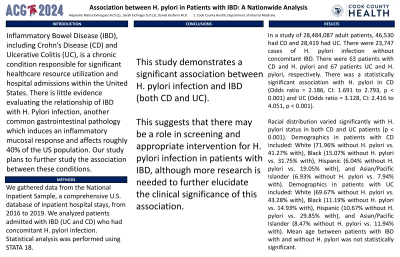Monday Poster Session
Category: IBD
P2685 - Association Between H. pylori in Patients With Inflammatory Bowel Disease: A Nationwide Analysis
Monday, October 28, 2024
10:30 AM - 4:00 PM ET
Location: Exhibit Hall E


Alejandro J. Nieto Dominguez, MD
John H. Stroger, Jr. Hospital of Cook County
Chicago, IL
Presenting Author(s)
Alejandro J. Nieto Dominguez, MD, Sarah Eichinger, DO, Daniel Guifarro, MD
John H. Stroger, Jr. Hospital of Cook County, Chicago, IL
Introduction: Inflammatory Bowel Disease (IBD), including Crohn’s Disease (CD) and Ulcerative Colitis (UC), is a chronic condition responsible for significant healthcare resource utilization and hospital admissions within the United States. There is little evidence evaluating the relationship of IBD with H. Pylori infection, another common gastrointestinal pathology which induces an inflammatory mucosal response and affects roughly 40% of the US population. Our study plans to further study the association between these conditions.
Methods: We gathered data from the National Inpatient Sample, a comprehensive U.S. database of inpatient hospital stays, from 2016 to 2019. We analyzed patients admitted with IBD (UC and CD) who had concomitant H. pylori infection. Statistical analysis was performed using STATA 18.
Results: In a study of 28,484,087 adult patients, 46,530 had CD and 28,419 had UC. There were 23,747 cases of H. pylori infection without concomitant IBD. There were 63 patients with CD and H. pylori and 67 patients UC and H. pylori, respectively. There was a statistically significant association with H. pylori in CD (Odds ratio = 2.186, CI: 1.691 to 2.793, p < 0.001) and UC (Odds ratio = 3.128, CI: 2.416 to 4.051, p < 0.001). Racial distribution varied significantly with H. pylori status in both CD and UC patients (p < 0.001). Demographics in patients with CD included: White (71.96% without H. pylori vs. 41.27% with), Black (15.07% without H. pylori vs. 31.75% with), Hispanic (6.04% without H. pylori vs. 19.05% with), and Asian/Pacific Islander (6.93% without H. pylori vs. 7.94% with). Demographics in patients with UC included: White (69.67% without H. pylori vs. 43.28% with), Black (11.19% without H. pylori vs. 14.93% with), Hispanic (10.67% without H. pylori vs. 29.85% with), and Asian/Pacific Islander (8.47% without H. pylori vs. 11.94% with). Mean age between patients with IBD with and without H. pylori was not statistically significant.
Discussion: This study demonstrates a significant association between H. pylori infection and IBD (both CD and UC). This suggests that there may be a role in screening and appropriate intervention for H. pylori infection in patients with IBD, although more research is needed to further elucidate the clinical significance of this association.
Disclosures:
Alejandro J. Nieto Dominguez, MD, Sarah Eichinger, DO, Daniel Guifarro, MD. P2685 - Association Between <i>H. pylori</i> in Patients With Inflammatory Bowel Disease: A Nationwide Analysis, ACG 2024 Annual Scientific Meeting Abstracts. Philadelphia, PA: American College of Gastroenterology.
John H. Stroger, Jr. Hospital of Cook County, Chicago, IL
Introduction: Inflammatory Bowel Disease (IBD), including Crohn’s Disease (CD) and Ulcerative Colitis (UC), is a chronic condition responsible for significant healthcare resource utilization and hospital admissions within the United States. There is little evidence evaluating the relationship of IBD with H. Pylori infection, another common gastrointestinal pathology which induces an inflammatory mucosal response and affects roughly 40% of the US population. Our study plans to further study the association between these conditions.
Methods: We gathered data from the National Inpatient Sample, a comprehensive U.S. database of inpatient hospital stays, from 2016 to 2019. We analyzed patients admitted with IBD (UC and CD) who had concomitant H. pylori infection. Statistical analysis was performed using STATA 18.
Results: In a study of 28,484,087 adult patients, 46,530 had CD and 28,419 had UC. There were 23,747 cases of H. pylori infection without concomitant IBD. There were 63 patients with CD and H. pylori and 67 patients UC and H. pylori, respectively. There was a statistically significant association with H. pylori in CD (Odds ratio = 2.186, CI: 1.691 to 2.793, p < 0.001) and UC (Odds ratio = 3.128, CI: 2.416 to 4.051, p < 0.001). Racial distribution varied significantly with H. pylori status in both CD and UC patients (p < 0.001). Demographics in patients with CD included: White (71.96% without H. pylori vs. 41.27% with), Black (15.07% without H. pylori vs. 31.75% with), Hispanic (6.04% without H. pylori vs. 19.05% with), and Asian/Pacific Islander (6.93% without H. pylori vs. 7.94% with). Demographics in patients with UC included: White (69.67% without H. pylori vs. 43.28% with), Black (11.19% without H. pylori vs. 14.93% with), Hispanic (10.67% without H. pylori vs. 29.85% with), and Asian/Pacific Islander (8.47% without H. pylori vs. 11.94% with). Mean age between patients with IBD with and without H. pylori was not statistically significant.
Discussion: This study demonstrates a significant association between H. pylori infection and IBD (both CD and UC). This suggests that there may be a role in screening and appropriate intervention for H. pylori infection in patients with IBD, although more research is needed to further elucidate the clinical significance of this association.
Disclosures:
Alejandro Nieto Dominguez indicated no relevant financial relationships.
Sarah Eichinger indicated no relevant financial relationships.
Daniel Guifarro indicated no relevant financial relationships.
Alejandro J. Nieto Dominguez, MD, Sarah Eichinger, DO, Daniel Guifarro, MD. P2685 - Association Between <i>H. pylori</i> in Patients With Inflammatory Bowel Disease: A Nationwide Analysis, ACG 2024 Annual Scientific Meeting Abstracts. Philadelphia, PA: American College of Gastroenterology.
